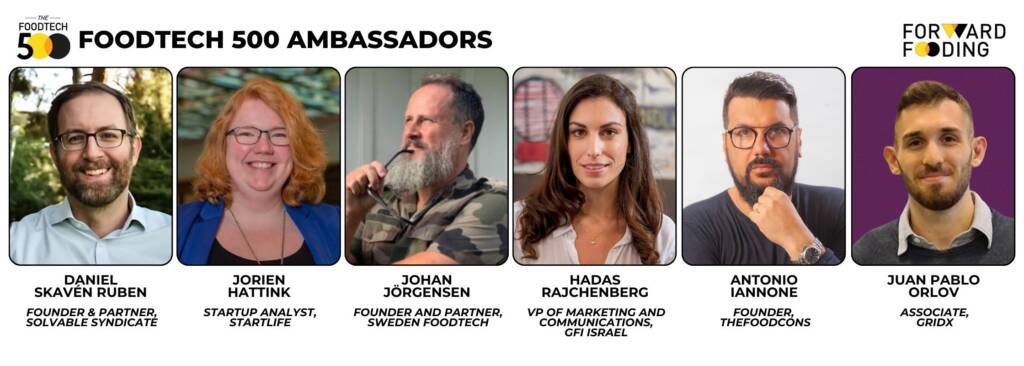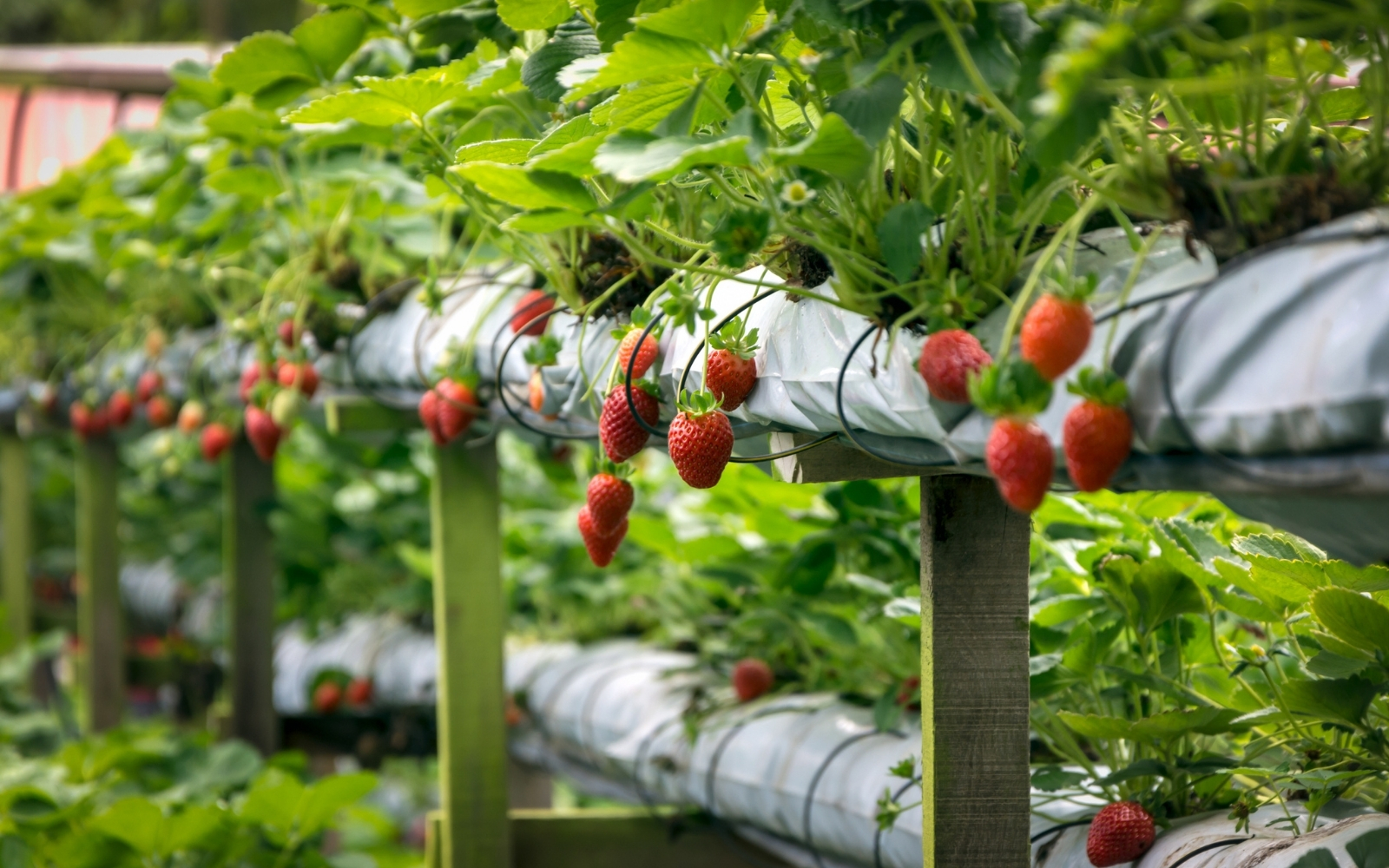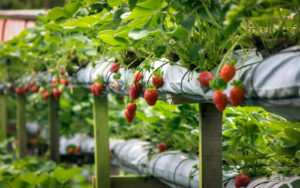Expert Insights: How FoodTech 500 Ambassadors Envision the Next Chapter of AgriFoodTech
As we approach the highly anticipated unveiling of the 2024 FoodTech 500 rankings on March 18, we’ve gathered insights from the FoodTech 500 Ambassadors to take the pulse of the global FoodTech ecosystem. Against the backdrop of a 73% drop in global AgriFoodTech investments since 2021, these industry leaders offer valuable perspectives on investment trends, emerging technologies, sustainability challenges, diversity in leadership, and the companies defining the future of food. Their collective wisdom reveals an industry in transition, yet one that remains fundamentally optimistic about the transformative potential of food technology to address our most pressing global challenges.
Investment Landscape Reflection
The FoodTech 500 Ambassadors largely agree that the massive drop in global AgriFoodTech investments reflects a broader market correction and shift in investor priorities. There’s consensus that 2025 will continue to see cautious investment, with a stronger focus on profitability, efficiency, and sustainable business models rather than speculative growth. Many expect funding to eventually recover, with investors becoming more selective and startups needing to demonstrate clear paths to revenue and financial sustainability.

Forward Fooding Team: Considering the 73% drop in global AgriFoodTech investments in 2024 since 2021, how do you anticipate the investment ecosystem will adapt or transform in 2025? What strategic shifts do you foresee for startups and investors?
Daniel Skaven Ruben: More focus on profitability rather than growth. Startups need to be more frugal and find alternative funding sources (grants, etc) to a higher degree.
Johan Jorgensen: I expect funding to rise again. The fundamentals haven’t changed, but the era of free money is gone, and with that, inflated valuations and snake oil entrepreneurs… The ups and downs are quite normal – only completely new entrepreneurs see the roller-coaster as something terrifying. It’s normal.
Jorien Hattink: We currently see that there is a vacuum in the investor space for early-stage investments… I expect that there will be fewer success stories when it comes to investments, but the investments that happen will have a bigger impact.
Antonio Iannone: In my view, 2025 will continue to be a year of evaluation and adjustment. Since 2021, investors have shifted their focus toward profitability rather than pursuing ‘monster growth,’ a trend that is expected to persist throughout this year. A potential recovery may not materialize until 2026.
Juan Pablo Orlov: Investors in FoodTech are becoming more selective than ever, prioritizing startups that are capital efficient, show strong unit economics, and have real traction. With fewer deals happening, the focus is shifting from casting a wide net to doubling down on portfolio companies that have the best chance of succeeding.
Hadas Rajchenberg: Given the drop in global AgriFoodTech investments since 2021, I anticipate that the investment ecosystem will undergo significant strategic adjustments in 2025:
- Startups will need a clear go-to-market strategy and roadmap: Investors will no longer back early-stage startups without clear validation of product-market fit. Startups will need to present a solid go-to-market plan, including a clear path to product launch and scaling. A focus on solving the core challenges of the industry, such as price parity and taste parity, will be essential to gaining investor confidence.
- Investors will remain cautious but focused on AI-driven solutions: Given the challenging investment climate, investors will continue to be selective, directing capital toward startups that integrate AI into their core technology and business model. However, if interest rates decrease as anticipated, it could unlock more liquidity and drive increased investment activity, particularly toward companies demonstrating strong market potential.
Emerging Technologies and Domains
Ambassadors highlight several transformative technologies addressing global food system challenges, with strong consensus around biotech, fermentation technologies, and AI-driven solutions. The responses emphasize technologies that can simultaneously address multiple challenges, including climate change, resource efficiency, sustainability, and food security. Precision fermentation, cellular agriculture, and AI-powered tools are viewed as particularly promising for creating a more resilient and sustainable food system.

Forward Fooding Team: Our data shows rising domains like Ag Biotech, Protein Fermentation, and Biotech/ Synthetisation gaining prominence. What emerging technologies do you believe will be most transformative in addressing global food system challenges?
Ronald Lim: Precision Fermentation: Produces proteins, enzymes, and other food ingredients using microorganisms, reducing reliance on animal agriculture and its environmental impact.
Hadas Rajchenberg: I believe we will see more biomass fermentation and food wastetech.
Noah Petermann: Protein & Fermentation will be transformative, but we need to be realistic about adoption rates. I don’t see these technologies exceeding 45% market penetration in the short term. The key challenge remains making these innovations accessible through improved cost structures.
Mary van Hoek-Hendriks: Cellular Agriculture will become more relevant in combination with precision fermentation to develop hybrid meat products combining the best of both worlds.
Jorien Hattink: Specialty ingredients derived from existing protein solutions. I predict the request for functional ingredients from non-novel food origin will keep being a big trend for the plant-based space, and will become more specific.
Mariya Hristova: Emerging technologies such as AI-driven precision agriculture, CRISPR gene editing, and microbial fermentation will play a transformative role in addressing global food system challenges. AI-powered farm management systems will optimize resource use, reduce waste, and enhance productivity across the value chain.
Johan Jorgensen: Probably technologies that enable us to get a deeper understanding of climate and life, which boils down to capturing and crunching huge volumes of data. Sensors and AI will be key.
Daniel Skaven Ruben: Anything that can help make the food system more sustainable and nourishing. So e.g. alternatives to chemical fertilizer/pesticides/herbicides/fungicides, tech to help cut post-harvest food loss and waste, methane reduction feed additives, alt proteins, etc.
Sustainability and Impact
Ambassadors recognize technology as the cornerstone for addressing critical sustainability challenges, particularly related to Climate Action (SDG 13) and Life on Land (SDG 15). There’s a growing emphasis on solutions that can provide both environmental benefits and financial returns in the near term. AI, precision agriculture, IoT sensors, and innovations in food waste reduction are highlighted as promising approaches for creating more sustainable and resource-efficient food systems.

Forward Fooding Team: We’ve noted a growing focus on Climate Action (SDG 13) and Life on Land (SDG 15) within the most addressed SDGs among FoodTech companies. How do you see technology playing a role in addressing critical sustainability challenges, and what innovative approaches are most promising?
Susie Warran-Smith: Technology will play a huge part in addressing SDG13, but only if it can solidly prove a financial return or at least be cost-neutral in a relatively short space of time.
AI, satellite imaging, and IoT sensors, in particular, will help farmers optimise water use, reduce chemical inputs, and sequester carbon in the soil. In addition, AI-driven food inventory systems and dynamic pricing algorithms will help to cut the current huge amount of food waste at every level.
Jorien Hattink: New technologies are currently seen as a holy grain to solve issues. At the same time, I see a push for existing and proven technologies to spread towards different applications, therefore increasing the impact of technology and thus decreasing the push to prove new ones.
Antonio Iannone: I foresee a significant increase in the adoption of smart farming by food companies, aimed at digitizing and greening their supply chains. However, I believe there is still a substantial gap in consumer education regarding sustainability—an area where the entire ecosystem can and must improve.
Diversity and Leadership
A common theme is the need for more female investors who can better understand and support female founders. Many highlight the importance of addressing unconscious bias, creating more inclusive funding mechanisms, and recognizing the different presentation styles and risk approaches that women often bring to entrepreneurship.

Forward Fooding Team: Female-founded companies in the FoodTech 500 have increased by 34% since 2020. Despite this progress, what structural changes do you believe are necessary to continue supporting and expanding diverse leadership in the FoodTech ecosystem?
Johan Jorgensen: Investors need to start realizing that female founders don’t lie as much as their male tech-bros, nor do they fail as much. We need more women investors. Perhaps something for the EIC to put in their criteria?
Susie Warran-Smith: Women present in a different way, do not exaggerate their skills and are more risk averse – this needs to be taken into account when funding decisions are made up against someone who is doing the opposite. Many statistics show that women-led businesses are more likely to be successful, but shockingly they get next to no funding.
Daniel Skaven Ruben: We need more female investors. They will invest in female founders, and support the next generation of entrepreneurs.
Mariya Hristova: The rise in female-founded FoodTech companies is a positive shift, but structural changes are needed to sustain this momentum. Increased access to funding through dedicated investment vehicles and mentorship programs specifically designed for underrepresented founders will be crucial to building a more inclusive ecosystem.
Jorien Hattink: Governmental and external push to keep these trends going continues to stay important as I don’t believe we are at a stage where such trends will continue on their own. I hope that I’m wrong as I worry that the push to keep this trend will decrease with the worry about ‘wokeness.’ Instead, I think more DEI-directed policies should be implemented to not just push women but diversity overall.
Deep Dive
Despite current challenges, the FoodTech 500 Ambassadors expressed an underlying optimism about the sector’s potential for recovery and long-term impact, with particular attention to making healthier, more sustainable food options accessible to mainstream consumers.
Forward Fooding Team: Please share any additional insights, predictions, or observations about the FoodTech landscape that you believe are crucial but may not have been captured in the previous questions.
Johan Jorgensen: We often talk about food tech investments when we really should talk about the enormous societal transformation with food at the core that is about to happen. Hundreds of billions of euros need to shift direction, and that will fuel the development more than investments.
Daniel Skaven Ruben: We’re still in a funding drought. We likely will need some government funding to help finance the transition to a nutritious, sustainable food system.
Antonio Iannone: Let’s hold on—this year may seem challenging, but I’m confident the sector will recover soon. While the current landscape might appear tough, the long-term potential for innovation and sustainability in food tech remains strong. With continued investment, adaptation, and consumer awareness, the industry is poised to bounce back stronger than ever.
The insights shared by our FoodTech 500 ambassadors paint a picture of an industry at an inflection point. While funding challenges persist, there’s a clear shift toward more sustainable business models, technological innovation, and inclusive leadership that promises to reshape our global food system. As we prepare to celebrate the achievements of the 2024 FoodTech 500 companies, it’s evident that the path forward requires not just technological breakthroughs, but also structural changes in how we invest, innovate, and collaborate. Despite current headwinds, the fundamental drivers of FoodTech innovation—climate action, food security, and resource efficiency—remain stronger than ever, pointing to a resilient and impactful future for the ecosystem.
Get to know all the FoodTech 500 Ambassadors here. Want to become a FoodTech 500 Ambassador? Learn more about the initiative and submit your application here.
Be on the lookout for the full list rankings, dropping at: forwardfooding.com/foodtech500/
Forward Fooding is the world’s first collaborative platform for the Food & Beverage industry via FoodTech Data Intelligence and Corporate-Startup Collaboration – Learn more about our Consultancy and Scouting Services and our Startup Network.
This post Expert Insights: How FoodTech 500 Ambassadors Envision the Next Chapter of AgriFoodTech appeared first on Forward Fooding – Powering the Food & Food Tech revolution!.














Post Comment